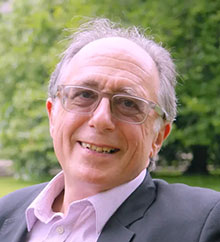Francis Lévi


- Year of birth: 1949
BIOGRAPHY
Francis Lévi, a French medical oncologist, led the development of oxaliplatin at all phases. He used chronotherapy techniques for circumventing the peripheral sensory neuropathy and gastrointestinal and haematological toxicities resulting from early administration with short infusions schedules. In animal studies he demonstrated that tolerability and efficacy of oxaliplatin were three times and nearly twice as large respectively, following drug dosing near the middle of the activity span compared to the rest span (1989).
These results inspired development of programmable-in-time drug delivery pumps, allowing adjustment of oxaliplatin delivery to circadian rhythms for reduced glutathione, and for DNA synthesis and repair mechanisms that are determinants of oxaliplatin effectiveness. Lévi demonstrated the safety and unprecedented efficacy of chronomodulated oxaliplatin, 5-fluorouracil (5FU) and folinic acid (leucovorin) in patients with metastatic colorectal cancers (1992, 1997).
An early encounter with Chinese medicine led Lévi to research biological rhythms and cancer. He graduated in medicine from the University of Paris V in 1976, and received a PhD from the University of Paris VI in 1982, after holding fellowships at MD Anderson and the University of Minnesota, US.
He is credited with discovering the concept of cancer chronotherapy where efficacy depends on the time drugs are given. Lévi has demonstrated the circadian time dependency of the therapeutic index of over 20 anticancer agents in experimental models and identified determinant rhythms in cell detoxification, proliferation, metabolism and DNA repair that are controlled by genetic clocks. He also showed the prognostic value of circadian rhythms in large cohorts of patients with colorectal cancer (2014), and their relevance as early warning signals of improvement or alteration of cancer patients’ health condition (2016). He went on to monitor these effects within modern frameworks of telemonitoring, telecare and precision chronomedicine (2020).
Lévi set up the clinical cancer chronotherapy Unit at Paul Brousse Hospital, Paris, in 1993, the chronotherapy group at the European Organisation for Research and Treatment of Cancer (EORTC) in 1996, and the French National Institute of Health and Medical Research (Inserm) team on biological rhythms and cancer chronotherapy in 2001. From 2014 to 2020, Lévi was professor of biomedicine and oncology at the University of Warwick, UK, where he researched the chronotherapy of novel metallodrugs and artificial intelligence assessment of circadian clocks.
Lévi steered or co-steered six European projects involving chronotherapy research, and led nearly 40 clinical or translational chronotherapy trials. Other achievements include establishing the curative potential of combining neoadjuvant chemotherapy and liver surgery for patients with liver metastases from colorectal cancer (1999) and showing sex to be a major determinant for optimal scheduling of FOLFOX (2012), and irinotecan (2020).
Lévi is an emeritus cancer research director at Paris-Saclay University and honorary professor of biomedicine and oncology at the University of Warwick.




